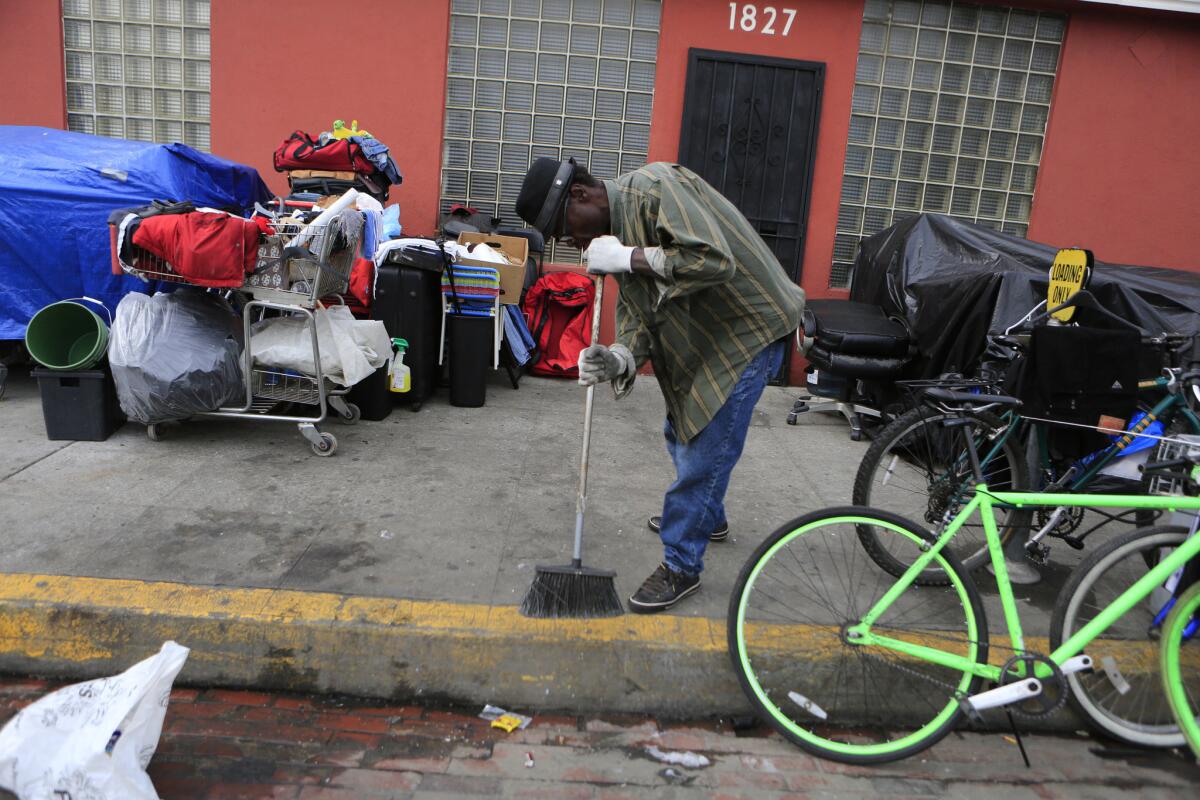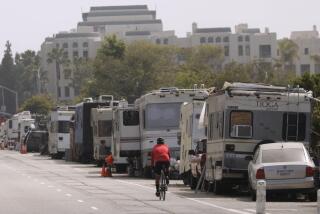L.A. vote makes it easier to break up homeless camps

Roy Carter, a 57-year-old homeless man, sweeps the sidewalk where his belongings are gathered on South Hope Street in January. Over the last two years, hundreds of street encampments have jumped their historic borders in downtown Los Angeles, lining the 110 Freeway and filling underpasses from Echo Park to South Los Angeles.
- Share via
The Los Angeles City Council on Tuesday gave preliminary approval to two ordinances designed to make it easier to break up homeless encampments, which have mushroomed across Southern California and raised an outcry from some businesses and residents.
Councilman Gil Cedillo cast the lone opposition vote, saying that the measures would perpetuate a failed strategy of criminalizing a homeless population that, despite past enforcement, grew 12% in the last two years.
“We spend $100 million on homelessness, and 85% of our response is law enforcement,” he said. “That tells us our strategy is not working.”
Council President Herb Wesson brought the measures to a vote without allowing public comment by protesters, who waited three hours as council members conferred with their lawyers in a closed-door conference. A court injunction currently limits the city’s ability to seize and destroy homeless people’s belongings, and the case remains active.
“We had half a roomful of people who wanted to be heard and they just pushed it through,” said General Jeff Page, a skid row activist. “That’s not fair.”
Councilman Joe Buscaino spokes up for the measures, which would sharply reduce the warning time homeless people have to move their possessions, and allow for immediate removal of couches, chairs and oversized tents.
“I’m very sensitive to the need to protect the constitutional rights of homeless people … but public spaces are public.” Councilman Curren Price called the said it was “fair, responsible and reasonable.”
Because the approval was not unanimous, the measures have to go back for a second reading before going to the mayor for a signature, and then becoming law.
Before the hearing, the Los Angeles Community Action Network, an anti-poverty group, and other skid row activists staged a demonstration outside City Hall, toting brown paper bags with slogans including “Public Space for All” and “Boo!”
Louise Mbella, Downtown Women’s Action Committee secretary, said the new ordinances are “just cruel.”
“If you negate the right to occupy public space to certain human beings, don’t call it public,” Mbella said. “You’re asking them to carry three suitcases on their backs.”
The measures would reduce to 24 hours from 72 hours the warning time homeless people are given before authorities seize their belongings from public sidewalks and parks. Bulky items including couches, tables and larger tents -- anything that won’t fit in the city’s 60-gallon trash bins -- could be confiscated without notice.
City Atty. Mike Feuer said the ordinances voted on Tuesday are “more specific and mindful of individuals’ rights than the current ordinance.”
Some homeless advocates, however, say the measures are written so broadly that their impact could vary widely depending on how they are enforced. Violations can be punished by citation or misdemeanor charges.
Opponents say the measures will do nothing to reduce homelessness, but rather will drive people underground.
MAP: Where are L.A. County’s homeless?
“They’re only concerned where the visibility of the homeless has become a problem,” said longtime skid row activist Alice Callaghan. “They don’t care about homeless people.”
The mayor has not taken a position on the measures, a spokesman said.
“Our office has been in discussion with the City Council about both ordinances to ensure the city’s approach is smart, thoughtful and calibrated to reducing homelessness,” the spokesman, Jeff Millman, said in an email.
Under a settlement agreement, homeless people can sleep on public sidewalks overnight but are supposed to fold up their tents from 6 a.m. to 9 p.m. In practice, homeless shantytowns have not only proliferated but grown more elaborate, and many remain in place all day.
A federal appeals court in 2012 issued an injunction barring the city from seizing and immediately destroying homeless people’s unattended personal property. The underlying legal case is still active.
The city will continue to store homeless people’s belongings for 90 days at a skid row warehouse, where they can be reclaimed.
City Councilman Mike Bonin has proposed adding more homeless storage throughout the city. His motion was referred to the council’s new homelessness committee, which is slated to meet for the first time Thursday.
Civil rights attorney Carol Sobel, who won the injunction on behalf of homeless people whose property was seized, questioned why the city would tighten enforcement before the storage can be expanded.
“It looks like, once again, the city is going to put enforcement way ahead of services,” Sobel said.
Twitter: @geholland
More to Read
Sign up for Essential California
The most important California stories and recommendations in your inbox every morning.
You may occasionally receive promotional content from the Los Angeles Times.











